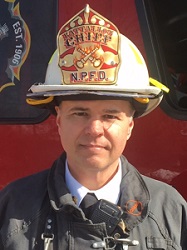
It is often said, accurately, that the company officer is the most important link when it comes to providing cohesive fire department operations. Each jurisdiction has its preferred method of promotion and progression through the ranks, therefore it’s helpful for the company officer to have a system to remain on track after he or she has begun to serve as the leader of a company.
Just as we have means to achieve and maintain orientation and situational awareness during incident operations, we can follow a clear path to maintaining orientation of some of the important aspects of officership during our day-to-day activities using the TEMP acronym. The letters represent training, education, mentoring, and paying attention. TEMP helps us with the short- to mid-range decisions so important to company leadership rather than providing goal-oriented benchmarks for long-term career progression. Building these daily skills will eventually be a pillar in career success for the company officer.
The “T” portion of the acronym represents training and drilling. For simplicity, these similar activities are grouped together. The training process consists of learning or teaching new material or skills. The company officer is the primary instructor for his or her firefighters and must remain abreast of new concepts and be capable of discussing with or teaching company members skills that may have recently evolved as best practice within the fire service. Additionally, the officer must retain a sense of humility and remain open to the ability of others to teach him or her new methods or pieces of equipment. This may sometimes include learning from younger members of the company who have advanced knowledge in a specialty skill.
RELATED FIREFIGHTER TRAINING
Words of Wisdom for the New Company Officer
What the Company Officer Should Be Thinking About
The Need for Company Officer Development
Company Officers, It’s All About You!
The concept of drilling within the company involves the practice of a skill already known or in use. This activity is imperative to the safety and efficiency of every fire company. Practicing in pursuit of perfection is the path to excellence. A big part of maintaining an orientation toward success for a company officer is the drill schedule he or she sets up each tour. Seeking input from firefighters and other officers will help relieve the pressure of developing scenarios and provide topics that are interesting and timely. Involving the company members will also achieve a buy-in and enthusiasm for the drill.
In the TEMP acronym, the “E” represents education. This portion of the company officer’s guide to remaining on focused and relevant is considered distinct from both training and drilling because it is significantly different in scope and application. In this context, the educational component consists of the opportunities for higher education that exist outside the fire department. Company officers should seek to excel beyond tactical operations to strategic planning and administrative functions. Many smaller jurisdictions require company level officers to perform collateral duties that require knowledge of budgeting, data analysis, and oversight of functions beyond emergency response operations. This remains true even if your agency does not place this responsibility on company level officers. Learning these skills will better prepare you for the future and help you understand the “how and why” of some of the orders and policies you must implement at the company level.
Mentoring is the “M” portion of the TEMP acronym and stands for maintaining officership orientation. The fire service is well acquainted with this process and has used informal mentoring for generations. Perhaps the most familiar version of this process is the relationship that may develop between the rookie and the veteran firefighter. Ideally an organization should establish a formal mentoring program in which experienced officers would offer insight to and evaluation of soon-to-be promoted or newly promoted officers. Even without an established program, officers both new and long-tenured should use mentoring to their best advantage as well as the good of the fire department as a whole. This is perhaps the most well-grounded of the officership orientation points. Veteran officers can contribute to the furtherance of the department by setting the pace for newly promoted officers. This relationship will be self- fulfilling to the veteran and keep the senior officer sharp and focused. In turn, the new officer will not only have trusted guidance to help build confidence, but a clear path to continued development, which they can someday provide to others.
Providing continued goals and opportunities for the experienced as well as the novice officer will result in a highly engaged officer cadre, thereby enhancing the morale, efficiency, and safety of the entire department. These opportunities to provide and receive mentoring and growth exist at all levels and ranks. Ideally, they are part of a formal plan for progression through the ranks. However, even an informal arrangement will provide direction, orientation, and a path for officership growth within the organization.
The final element of the officership orientation acronym is “P” for performance. The result of excellent officership is safe and efficient performance of emergency and routine duties. The process to achieve excellence is maintaining orientation at all levels. This includes continued improvement of the individual, the unit, and the organization. Each member of the fire service should conduct performance evaluations on themselves and their organizational elements. The company officer is entrusted with the mission of maintaining the effectiveness of most fundamental element of the fire department. To accomplish that goal, the officer must continually perform at a high level and strive to improve his or her knowledge and skills.
The performance self-check in the officership orientation process is a reminder to stay sharp in mind, body, and spirit. Each of these elements factor into the quality of leadership an officer can provide. Remaining mindful of actions to ensure the advancement of intellectual and physical well-being as well as nurturing loyalty to the fire service and the members of the company. The company officer should constantly seek new way to bolster his or her mind, body, and spirit as well as those of the other members of the unit. Like any acronym used to jog the memory, TEMP is meant to raise awareness and stimulate additional opportunities to add to its definition and interpretation. No matter how you define the arraignment of letters or the concept of orientation for officership, the concept of continual improvement and career development is vital, and your fire department will be the better for it.

David DeStefano is a battalion chief with the North Providence (RI) Fire Department, where he has served for 29 years. He is a shift commander in the operations division. He was previously chief of training and safety and has also served as a captain, lieutenant, and firefighter in Ladder Co. 1 as well as a lieutenant in Engine Co. 3. DeStefano is an instructor/coordinator with the Rhode Island Fire Academy and lectures on fire service topics throughout Southern New England. He was a presenter at FDIC International 2017 and 2018.

